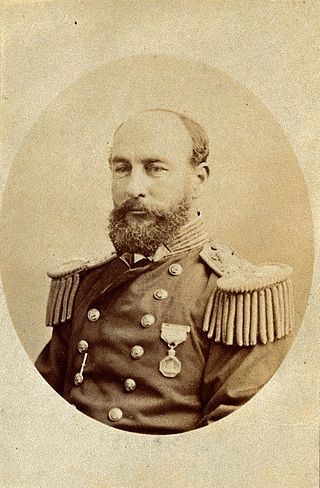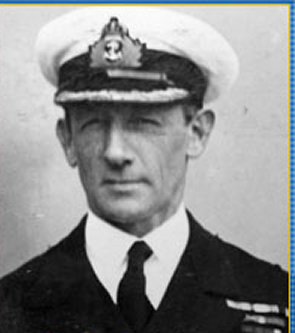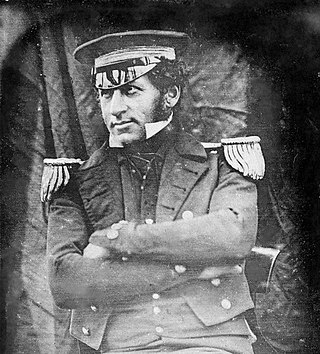
Cortlandt James Woore Simpson (2 September 1911, Westbourne, Sussex [1] to 9 May 2002, South Hams, Devon [2] ) - who was always known as Jim - was an English polar explorer and naval officer. [3]

Cortlandt James Woore Simpson (2 September 1911, Westbourne, Sussex [1] to 9 May 2002, South Hams, Devon [2] ) - who was always known as Jim - was an English polar explorer and naval officer. [3]
Jim Simpson was born into a naval family His grandfather, Vice-Admiral Cortlandt Herbert Simpson, was the commander of HMS Mullett and other vessels, and his father, Rear Admiral Cortlandt Herbert Simpson, also had a distinguished naval career. His family home for three generations was in Stoke-by-Nayland in Suffolk. Simpson sold it in 1969, building a smaller house for himself in the grounds, before eventually moving to Somerset and then to Devon in later life. [4]
Simpson was married four times and had one daughter.
His great-grandfather was John Busby, who along with his great-uncle James Busby were the fathers of the Australian wine industry.
He was commissioned into the Royal Navy following graduation from the Royal Naval College, Dartmouth. After service on several vessels, he resigned his commission in 1936 in order to study electrical engineering at the University of London.
He returned to the Royal Navy in 1939 as an electrical officer, serving as an anti-submarine specialist, and in destroyers.
He was awarded the Distinguished Service Cross in the 1945 King's Birthday Honours.
He retired from the Royal Navy in 1961. [5]
North Ice was the name of the Greenland ice sheet research station of the British North Greenland expedition (1952 to 1954). Led by Simpson, the expedition had its main base camp in Britannia Lake, Queen Louise Land. [6] Following the expedition Simpson was awarded the Polar Medal in 1954, and the Royal Geographical Society's Patron's Medal in 1955. [7]

Robert Edwin Peary Sr. was an American explorer and officer in the United States Navy who made several expeditions to the Arctic in the late 19th and early 20th centuries. He was long credited as being the discoverer of the geographic North Pole in April 1909, having led the first expedition to have claimed this achievement, although it is now considered unlikely that he actually reached the Pole.

Richard Evelyn Byrd Jr., an American naval officer, was a pioneering American aviator, polar explorer, and organizer of polar logistics. Aircraft flights in which he served as a navigator and expedition leader crossed the Atlantic Ocean, a segment of the Arctic Ocean, and a segment of the Antarctic Plateau. He is also known for discovering Mount Sidley, the largest dormant volcano in Antarctica.

Vice-Admiral Sir George Strong Nares was a Royal Navy officer and Arctic explorer. He commanded the Challenger Expedition, and the British Arctic Expedition. He was highly thought of as a leader and scientific explorer. In later life he worked for the Board of Trade and as Acting Conservator of the River Mersey.

Sir John Ross was a Scottish Royal Navy officer and polar explorer. He was the uncle of Sir James Clark Ross, who explored the Arctic with him, and later led expeditions to Antarctica.

Admiral Edward Ratcliffe Garth Russell Evans, 1st Baron Mountevans, was a Royal Navy officer and Antarctic explorer.

George Wallace Melville was a United States Navy officer, engineer and Arctic explorer.

The British North Greenland expedition was a British scientific mission, led by Commander James Simpson RN, which lasted from July 1952 to August 1954. A total of 30 men took part, though not all stayed for both years.
Thomas Vilhelm Garde was a Danish naval officer, distinguished for his explorations in Greenland.

Henry Grinnell was an American merchant and philanthropist.

Isaac "Ike" Schlossbach was an American polar explorer, submariner and aviation pioneer.

George John Dufek was an American naval officer, naval aviator, and polar expert. He served in World War II and the Korean War and in the 1940s and 1950s spent much of his career in the Antarctic, first with Admiral Byrd and later as supervisor of U.S. programs in the South Polar regions. Rear Admiral Dufek was the director of the Mariners' Museum in Newport News, Virginia after his retirement from the Navy in 1959.

Edward Hanson "Iceberg" Smith was a United States Coast Guard admiral, oceanographer, and Arctic explorer. He was born 29 October 1889 at Vineyard Haven, Massachusetts. He received a Ph.D. in oceanography from Harvard, and commanded the USCGC Marion and the USCGC Northland. Most famously, he commanded the Greenland Patrol, and led Coast Guard efforts to defend Greenland against the Germans in World War II. After retirement from the Coast Guard, he assumed the directorship of Woods Hole Oceanographic Institution.

Nikolai Nikolaevich Kolomeitsev, also spelt Kolomeytsev, was a naval officer of the Russian Empire and Arctic explorer. During the Russian Civil War, he fought for the Whites.

Admiral Sir Gerald Louis Charles Dickens was a senior Royal Navy officer and the grandson of Victorian novelist Charles Dickens.
Godske Christoffersen Lindenov or Lindenow was a Danish naval officer and Arctic explorer. He was a commander on one of King Christian IV's expeditions to Greenland.
Captain George Francis Arthur Mulock, DSO, RN, FRGS was an Anglo-Irish Royal Navy officer, cartographer and polar explorer who participated in an expedition to the Antarctic regions: the Discovery Expedition, 1901–04. After compiling the reports, logs and maps of the expedition, Mulock returned to full-time service, seeing action on the beaches of Gallipoli and later as the most senior naval officer to be captured at Singapore in 1942.

Vice Admiral Sir Georg Carl Amdrup, RN was a Danish naval officer, Vice Admiral and Greenland researcher.

Vice-Admiral William John Samuel Pullen was a Royal Navy officer who was the first European to sail along the north coast of Alaska from the Bering Strait to the Mackenzie River in Canada. His 1849 journey was one of the many unsuccessful expeditions to rescue Sir John Franklin and explore the Northwest Passage.

Graham Gore was an English officer of the Royal Navy and polar explorer who participated in two expeditions to the Arctic and a survey of the coastline of Australia aboard HMS Beagle. In 1845 he served under Sir John Franklin as First Lieutenant on the Erebus during the Franklin expedition to discover the Northwest Passage, which ended with the loss of all 129 officers and crewmen in mysterious circumstances.